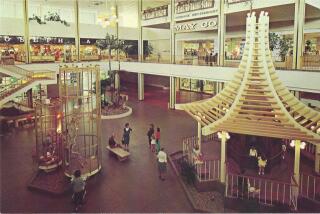Mall Reinvents Itself as Magnet for Black Shoppers : Marketing: Aging retail center was struggling until it focused on the needs of African-Americans in an Atlanta suburb.
- Share via
DECATUR, Ga. — B. Dalton Bookseller is opening a store in South DeKalb Mall, and the shopping center in a predominantly black Atlanta suburb is treating it as a royal event.
While most mall shoppers take for granted the presence of a book store, South DeKalb has been without one since B. Dalton pulled out three years ago.
The 1990 departure had been a low point for the once-struggling mall, but the return of the chain is emblematic of the center’s subsequent success at reinventing itself as a magnet for black shoppers.
After years of decline as the surrounding community shifted from a predominantly white to black population and vacant shops multiplied, South DeKalb began three years ago to reposition itself by targeting black consumers.
“I don’t think anyone else has done it to the extent they have,” said Ken Smikle, publisher of Chicago-based Target Market News, an industry publication covering minority business.
South DeKalb--owned by Columbia, Md.-based Rouse Co. and located about 10 miles east of downtown Atlanta--is now a thriving center featuring two large department stores, several national chains and local merchants who offer an array of “Afrocentric” merchandise.
The mix, from standard department store fare to carts selling African kente cloth scarves and calligraphy of quotations of black leaders, defies the notion that suburban malls are cookie-cutter enterprises.
“I think we’ve done a better job of listening to our customers,” said Robert Grahamslaw, South DeKalb’s general manager.
The mall, whose market is 80% black, has tried to make itself a part of the community. Its effort to bring back B. Dalton involved help from churches and schools in garnering 4,800 signatures on a petition.
A six-foot sign at the mall’s entrance congratulates the community for pushing the New York-based chain to reopen at South DeKalb.
Jeff Berk, B. Dalton’s vice president for real estate, said the decisions to leave and to return were based on economics. He said the mall has made a healthy recovery and today offers “a great mix” of national and local retailers.
South DeKalb also regularly holds focus groups in which customers are polled about merchandise preferences.
“What they told us was simple,” said South DeKalb marketing manager Wendell E. Kimbrough. “They wanted the same products they could purchase at any other shopping center, yet because this is ... predominantly an Afro-American community, they want to be sure there are also those products and those services and that environment that is clearly African-American.”
The Rich’s department store has a section featuring African art. Camelot Music is stocked with abundant jazz and gospel music. The B. Dalton bookstore, opening in March, will feature large black history and religion sections.
Until the mall operators got the message, sales were slipping an average of 5% a year. Marketing studies showed that black people in the area were unhappy with South DeKalb and would drive 20 miles out of their way to shop.
Sales have since rebounded. The 22-year-old mall expects a 15% sales increase for 1992, Kimbrough said.
“We needed something like this,” said Patrilla Arrington, who moved her Family Affair Beauty Salon into South DeKalb in December and also has begun shopping at the mall.
“We’ve been having to drive all over (to shop). Now they have more businesses and offer better facilities,” she said.
Jeffrey Humphreys, director of economic forecasting at the University of Georgia, said South DeKalb is a rarity for black shoppers. “The full range of retail outlets tends to be less available in black areas,” he said.
Humphreys noted, though, that south DeKalb County boasts one of the state’s most highly concentrated and affluent black populations.
Still, success depends on more than favorable demographics or stocking the right merchandise, said Smikle, of Target Market News.
“It goes back to whether a customer perceives you as saying, ‘Please come to my store,’ ” Smikle said. “You’re coming from a situation where you (blacks) are either not wanted or they’re not making any particular allusion to you being there.”
More to Read
Inside the business of entertainment
The Wide Shot brings you news, analysis and insights on everything from streaming wars to production — and what it all means for the future.
You may occasionally receive promotional content from the Los Angeles Times.










